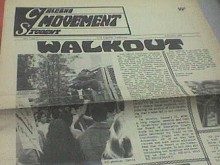This is part of a longer blog series, which you can find links to the previous as well as the next blog posts at the bottom of this blog.
 Forty four years ago students were walking out from schools in a reaction to the racism they faced in school and as a way to demand educational equity.
Forty four years ago students were walking out from schools in a reaction to the racism they faced in school and as a way to demand educational equity.
At the same time, being in the middle of all the excitement of the Chicana/o Movement, at Loyola-Marymount University, before the formal merger of Loyola University and Marymount College to today’s LMU, we find the United Mexican-American Students (UMAS) of Loyola- Marymount , precursors to today’s Moviemiento Estudiantil Chicana/o de Atzlan (MEChA) de LMU, coming together working towards the development and establishment of a Chicano Studies Department at Loyola-Marymount.
Looking through the university’s archives, I came across the original Proposal for a Chicano Studies Department presented by the UMAS of Loyola-Marymount. In this document, there is a letter addressed to the Loyola Faculty, a suggested structure and recommendations for the department, as well as the students’ rationale behind the kind of department they wanted.
In the letter to the faculty, the UMAS community addressd the lack of progress made towards the creation of the program which has brought them to suggest and propose the program based on research they have made. In the letter, we find the students expressing that “the need [for the program] is recognized by some, ignored by others, opposed by others and disguised by the rest.” So from this we can already get an idea of what kind of reaction they were getting from faculty and the Loyola-Marymount Community as a whole. Some were supporting the students and what they wanted while others were against or neutral to their wants and the situation created on campus. With that in mind, I wonder who were their allies and how did they go about in showing their support.
As for the structure and recommendation to the program the students knew what they wanted and had some expectations they hope were going to be respected in the implementation of the program. They wanted a structure that would understand the Chicano mentality with courses in “history, sociology and literature readings for a general understanding of the Chicano’s heritage and background.” They were also fighting to be respected as students through the integrity of the work they can produce as well as the subject itself.
The United Mexican-American Students of the Loyola-Marymount wanted a Chicano Studies Program “completely autonomous or structurally attached to an Ethnic Studies Program.” As far as the rationale they used to defend their position, the students presented both sides of the issue on whether the Chicano Studies department should be a stand alone department apart from Ethnic Studies or part of it. So in order to respect the integrity of the subject, since it was “too extensive to be squeezed into Ethnic Studies,” to avoid competition with other groups for attention, and to provided better funding to sustain itself on, were the reasons the students presented to avoid it being part of Ethnic studies. While the only reason to integrate the department into Ethnic Studies was that unity would be its outcome as it would be a “power base for continuation of program; Chicanos and Blacks are capable of sharing the program,” which goes to show the diversity present at the time, but more importantly they go on to say that the unity would leave the programs vulnerable to unhealthy competition further weakening the programs.
And so the students had expressed what they were expecting to see.
Sources:
Loyola University. Student Affairs Record Group. UMAS Proposal, 1968. RG 7, Record Series E: Student Organizations, Box 5. Loyola Marymount University Archives, Department of Archives and Special Collections, William H. Hannon Library, LMU, Los Angeles.
Photo:
top left: http://imagine2050.newcomm.org/2010/03/02/english-only-policies-threaten-civil-rghts/
bottom right: http://content.cdlib.org/ark:/13030/hb838nb5c1/
Read more:
The Birth of the Chicana/o Studies Department, Students Propose a New Program, From Chicano Studies Department to Mexican-American Studies Degree Program, Capstone Project Gone Blog, So You Want to Take Introduction to Chicana/o Studies?, So Let’s Put Some of the Pieces Together
